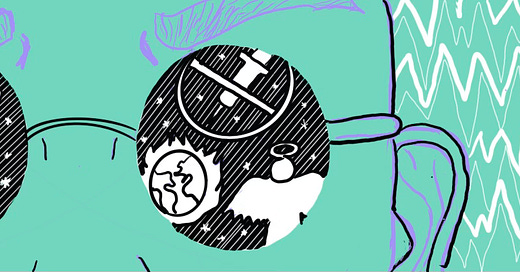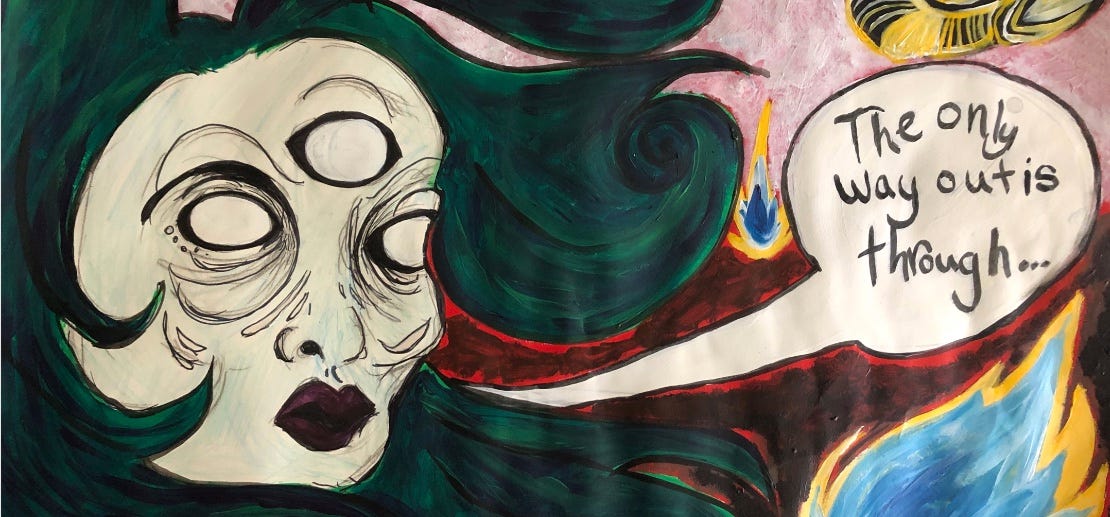Destination Coexistence
An American Dream
Conspiratorial beliefs have discernible ways of sinking their hooks into people, and there is a difference in how this plays out across class lines. The wealthy, I theorize, buy in (even when they don’t necessarily believe) and recirculate conspiracy to protect their own interests. If the populace, from whom they extract labor and capital, perpetually turn their gaze outward to flying monkeys, they are less likely to see that it is the man (or woman) behind the curtain profiting from their hard work and sacrifices. This, in turn, makes them less likely to unite and tear the curtain down.
Meanwhile, often on the factory floors of America, the appeal of conspiracy holds an alluring sheen. The rapid nature of modernity isn't something we’ve adjusted to easily as a species, and the effects on many families are real and felt throughout the world. In this idealized country of ours—one that professes to be founded on principles of personal freedom—a large faction of us are continuously conned into thinking that by our own innate skill-sets and exercise of will, we can generate an income and stave off poverty and crisis. Everything is privatized and capitalized on—health care, insurance, education, and most troubling, personal identity.
This notion of monetizing one’s mere presence in the world is one that Naomi Klein also digs into extensively in the first half of Doppelgänger. What it means, with the communication technologies and social media platforms we have today, is there is no longer any reason, by its brutal logic, as to why we should fail to receive basic human dignity if we can theoretically find some way to “foot the bill.” Productivity, seemingly titrated into every facet of life, has swiftly become the new form of security in most of America.
I reached a point shortly after the Trump election where my attempts to play by these roles became so frenzied that my whole body went on strike. I was working sixty hours a week between two jobs and living in a room with three other people in downtown Seattle, and slowly felt my heart break as I succumbed to frequent episodes of migraine, spontaneous vomiting, and extreme adrenal fatigue. Humiliated and defeated, I called my mom one evening after a particularly punishing day and asked if I could come back home.
In the ensuing months, my anxiety continued to rampage so persistently that laying down for any period of time in my childhood bedroom, when not asleep, was restless and stirring. I signed up for countless online services that promised to connect me with folks who needed freelance editing/writing/illustration work and was rejected from every job I applied for—mostly because I hadn’t yet landed other jobs on these platforms for which I could be reviewed. I read tarot cards online, in the wee hours of the morning, but had to stop after a client began ceaselessly harassing me. I stayed up all night many nights, for months, feeling terrified that I would have no place in the rapidly shifting economy.
I reached a point shortly after the Trump election where my attempts to play by these roles became so frenzied that my whole body went on strike. I was working sixty hours a week between two jobs and living in a room with three other people in downtown Seattle, and slowly felt my heart break as I succumbed to frequent episodes of migraine, spontaneous vomiting, and extreme adrenal fatigue. Humiliated and defeated, I called my mom one evening after a particularly punishing day and asked if I could come back home.
This frenetic pace demanded by this lifestyle is neither natural nor humane. In her 2020 book on this topic, Do Nothing, Celeste Headley writes: “While an obsession with efficiency and productivity is found all over the world, nowhere is it more evident than in the United States, where nearly 70 percent of citizens believe they will achieve the American Dream and that the most important factors in achieving economic success are hard work and personal drive.” Much of the capitalist messaging that props this up and keeps us in its jaws is the insistence that we can override our self-preservation instincts in favor of a paycheck. Your personal will to do so determines your worth, it reasons, and this is reinforced by how thin the fabric of our social nets are—they are wont to rip and tear open at the slightest disturbance.
This is a pill that has been swallowed hard by Gen-X and Millenial generations (Gen Z is more likely to see through the veneers ) as our workforce continues, en masse, to be influenced by outdated ideas, generated in times when we had a larger and more accessible middle class. Nowadays, many of us inevitably confront catastrophe and failure. No amount of extra hours can face down soaring medical bills that surpass hundreds of thousands of dollars while we or our loved ones battle for our lives in respirators or ICUs. I name this specifically because healthcare, more than any other unpredictable expense, has sowed the foundation for traumatic debt in our country. The uninsured are often that way because even the expense of Obamacare carries too high a deficit on their meager subsistence, and the price tag for an injury, a heart issue, a cancer, or—God forbid, a bad case of Covid—is decades, if not a lifetime, of economic punishment. Who wouldn't be radicalized by this?
Even in this bleak landscape with endless access to excellent work by journalists and activists to highlight this rabid inequity, the all-too-effective playbook of many right-wing (and particularly alt-right) actors is to obscure class division in favor of emphasizing racial division. It’s tied to various business models that rely on the internet as a portal to unlimited income. This is the lining of many multi-level-marketing schemes, which are as pervasive in the online holistic living space as they are in the garages of middle America. In this tangled overlap, one of the “universal truths" that is mantra’d to death is that your attitude dictates your earnings. The message is to “suck it up” and just keep going toward an illusory rainbow, the unicorn myth of meritocracy.
When the majority of people you interact with are also going by this same set of dysfunctional rules, even if they have struggled within it, you have a consensus reinforcement of the system that is failing you. Your options are to begrudgingly adapt and continue to toil in a way that never actually delivers stability, or—in a manner that some might even be tempted to view as an act of sanity—begin to question the system in its entirety.
Healthcare, more than any other unpredictable expense, has sowed the foundation for traumatic debt in our country. The uninsured are often that way because even the expense of Obamacare carries too high a deficit on their meager subsistence, and the price tag for an injury, a heart issue, a cancer, or—God forbid, a bad case of Covid—is decades, if not a lifetime, of economic punishment. Who wouldn't be radicalized by this?
The Mirror World’s siren song
As you would expect, it is the people who’ve experienced and survived these emotional tides who are best able to to exploit personal catastrophe in others. Going a step beyond the model of toil that has just proven to be insufficient to meet their needs, they spin ever-more-fantastical webs of mythology and turn to peddling products that promise emotional convalescence and handrails to a healthier and wealthier life. These ‘movements’ are often easily identifiable to outsiders as grifts that rob their followers or consumers of time, energy, and (always) money. We need look no further than the cultish world of Multi-Level-Marketing to see the predatory nature and acute hazards of doing the most to appease capitalism. However, a lot of MLMs, pyramid schemes, and life-improvement courses also develop out of ideological wells that are a step beyond what you might find in the throes of Amway or Nutralife. So what about those who’ve been lured into and ensnared by these even more noxious prisms of dogma?
What Love Has Won reminded me poignantly—and what Klein highlights throughout Doppelgänger—is how powerfully our social bonds influence our perceptions and shape our survival strategies. We see this in the flight path of Naomi Wolf’s trajectory: exiled from the pack that purchased her books and published her work, she sought alternative outlets for her less mainstream ideas, and then quickly self-immolated in the throes of the attention she found. Wolf, simply put, found her community, or at least was lead into one that could match the level of acclaim and acceptance to which she’d become accustomed—not as a seasoned feminist scholar, but as a talking head for controversial opinions that are actually deleterious to public health and well being. The space that the online right has cultivated is one where it is more frightening to be rejected than policed.
As Klein argues in her book, those of us on the left have failed to do the same, noting the manner in which we in-fight and sow division within our own ranks:
“When we have differences, we tend to focus on them obsessively, finding as many opportunities as possible to break apart…Moreover, when entire categories of people are reduced to their race and gender, and labeled ‘privileged,’ there is little room to confront the myriad ways that working-class white men and women are abused under our predatory capitalist order, with left-wing movements losing many opportunities for alliances that would make us stronger and more powerful.”
This has consequences beyond interactional discomfort. As Klein deftly points out, “all of this is highly unstrategic, because whichever groups and individuals we kick to the curb, the Mirror World is there, waiting to catch them, praise their courage, and offer a sympathetic ear."
Behind the storefront
There’s much to admire in Klein’s work, including her willingness to look beyond the North American borders of our surface world and examine our connection and effect upon the world below—including Central and South America. America’s ascent to the top of the global food chain has accelerated in the past century. But as the world’s distribution of power and wealth evolves into a multi-polar arrangement, North Americans are struggling to envision a future that continues to deliver the lion’s share of global spoils to which we’ve grown accustomed. The hierarchical structures of race, class, and religious belief have always distorted our perceptions and story-telling. We are the victors who write the curriculum, either erasing or hurriedly skipping over patterns of violence enacted by white settlers and multi-national corporations to spare the guilt in our descendants. The parts of the world we exploit through our methods of trade and carbon-baking of the planet comprise what Klein calls “the Shadow World.”
Klein explores the cycles of projection and deflection that have enabled not only corporate expansion, but also authoritarianism in manners small and large. She teams up with the work of Brazilian philosophy professor Rodrigo Nunes to articulate one of her book’s most arresting passages:
“Like the clutch of professional climate-change deniers who claim to ‘debunk’ the avalanche of scientific evidence that the planet is warming by deploying entirely decontextualized temperature charts, along with outside data and a steady flow of complex scientific terms, Wolf also engages in what we might think of as a picking of the science…The end result of being surrounded by this kind of discourse is a reflexive state of continuous disbelief that the Brazilian professor of philosophy Rodrigo Nunes calls ‘denialism.' This is an upside-down state that, like everything else in the Mirror World, neatly services the right and undercuts the left because, Nunes writes, it ‘displaces the real threats looming on the horizon into distorted, fun-house version of themselves. Thus, the problem with democracy is not political elites everywhere who are beholden to the interests of corporations and financial markets, but a secret cabal of pedophiles planning to institute a world government.”
A few pages later, Klein summarizes the basis of her book’s third section, writing that,
“…there are other conspiracies that are also real and distinctly seedier than those hatched in antiseptic boardrooms in New York and London to rig prices or fool regulators or sabotage a newly elected socialist government in the Global South. That’s because the surface layers of markets that middle-class people in wealthy parts of the planet engage with directly— brightly lit grocery stores and gas stations, sleek websites and dull offices—are not the whole story of capitalism; they are its storefront. All of these operations require a level of extraction from their workers, shoppers, and users, but they also sit on top of more hidden parts of the supply chain, zones of hyper-exploitation, human containment, and ecosystem poisoning that are not glitches in the system but have always been integral parts of what makes our world run.”
Humans are wired for two, often competing interests: survival and connection. So what do we make when we are born into a level of material comfort wherein we have graduated—via the distribution of global wealth created through systems of violence—from the pressure to survive in favor of the pressure to sustain and enlarge our convenience? What must we think of ourselves when we find that our ambitions and adaptations come with such a high price, and one that is largely hidden from us? For poor people, it arrives with the bonus shames of not being able to achieve or maintain the supposed “normalcy” of the middle class that saturates the planet through our advertising. And once you dig into history, the salt in the wound is that America as a militaristic entity has oceans of blood on its hands from the liberal democracies it has undermined and straight-up coup’d.
Unlike previous generations, we now have a fast-track highway in the form of the internet by which we can connect to people who’ve had similar experiences and drawn similar conclusions. The instinct of our nervous system is there is safety in numbers. A sense of safety quickly anesthetizes uncertainty, as any good therapist can tell you.
The hierarchical structures of race, class, and religious belief have always distorted our perceptions and story-telling. We are the victors who write the curriculum, either erasing or hurriedly skipping over patterns of violence enacted by white settlers and multi-national corporations to spare the guilt in our descendants. The parts of the world we exploit through our methods of trade and carbon-baking of the planet comprise what Klein calls “the Shadow World.”
Striding with compassion, and alarm
I often tell people that I study extremism. What they don’t hear in that sentence is that I’m trying to understand people who were once my friends. People in my family, who I believe have come to be afraid of me because they don’t feel they can possibly understand me.
At decent intervals I’m also trying to understand the alternate-version reality of myself—a less fortunate young person who, in a critical time of her life, didn’t receive the caliber of professional help I did, and didn’t have parents who would walk alongside me in adulthood to a more stabilized nervous system. In my mirror world, I imagine I would have instead stayed aggrieved, angry, and utterly disillusioned with the healthcare system, and ended up spouting eco-fascist talking points about how Covid is Mother Earth conducting “system maintenance,” or becoming a rabid Teal Swan follower, or hawking cheap crystals dug up on stolen land by day laborers to treat first-world inflammation. It’s a first-world luxury that because I have spent such a profound amount of time contemplating this other-me, I have reflexively developed compassion for her, and this has allowed me to propagate empathy for others who seem to have gone extremely off-book with the reality of their lives.
I would say that I don’t want to alarm you, but the reality is that I do. The recent global tilts toward fascism is not just in our political theater, it’s on our doorsteps. It’s in good people whom we care about, even though they have deprioritized the rights and quality of life of others beyond their immediate experience. I am arguing that part of the reason they’ve done so is because it is fundamentally painful for humanity—a genus of animal that psychologically and emotionally revolves around its network of social relationships—to face the abject cruelty, harm, and slaughter it has imposed on others.
At the same time, I think it important for the radical cohort of Gen Z to understand that our beliefs can only evolve as quickly as we do. With an ever-increasingly diverse populace, it is weirdly true that we are still shaking off ideas about hierarchy, race, and gender that have been in place for hundreds, sometimes thousands of years. We have to figure out, preferably sooner than later, how to coexist with minimal violence. Left-leaning folks are not always going to nail the process and practice of creating more enlightened social and ideological templates. Yet culture discourages us, in a way I haven't yet worked out, against admitting when we are wrong, and owning the pain of behavior influenced by mistaken views.
The reality that we often take a discernibly hostile approach—excoriating those who disagree with us, imposing our supposed intellectual superiority over them—may be the primary reason people disillusioned with the system are also disdainful of progressive politics. (How these people are instead co-opted by social media algorithms that drive them into an open and waiting radical, white-supremacy laden right is expertly explored in the podcast Rabbit Hole, which I cannot recommend enough.) It is also something that begs examination in light of how many of our so-called “radical” progressives recently endorsed House resolution 888, that effectively decreed criticism of Israel’s colonialist origins as antisemitic.
On this subject, what is most troubling and sobering in the U.S. government’s embrace of the Israeli response to Oct. 7 was a swift, bipartisan endorsement of a reflexive resort to mass punishment. To me, it demonstrates what occurs when suffering creates its own trap and begets entitlement, especially entitlement to punishment, as expressed through Benjamin Netanyahu (a person whom I do not, for the record, see as largely representative of the preferences and/or views of his populace.)
Presciently, Naomi Klein devotes the last chapter of Doppelgänger to the conflict, and as a Jewish person, considers the myriad Russian dolls within the policy and protocol surrounding its treatment of Palestine. Reading it in the context of the present news cycle, I found it both insightful and a strong argument for banging my head against a wall, maybe forever. Could it really surprise anyone that the country with the world’s largest incarcerated population is hesitant to put the breaks on fascist control of a fellow colonial nation-state? Hasn’t Angela Davis been trying to connect this for us over the last several decades?
Facing the face of fascism
But here’s what I would ask you to think about: in part because of Biden’s catastrophic lapse of humanitarian responsibility amidst this conflict. I fear fascism is about to become much more relevant to all of our lives. I will be shocked, honestly, if Trump isn’t re-elected, and many of my close friends share these feelings. I am a social worker/grad student living a cliché radical-leftist life in our country’s most progressive city, and yet Trump and the wormhole he has created in society is less than a stone’s throw away from my personal, offline milieu.
The reasons why are simple: our experience as a country is only getting more diverse, and will continue to be doing so. The increasing proportion of folks over 65 also means that we will become more chronically ill and disabled as a country, let alone for reasons related to a novel virus that we are still learning more about daily, including its potential to impart lifelong damage. And finally, we are not—as evidenced by COP 28—going to outrun the most dire warnings of climate change, which means disastrous weather will continue to displace immigrants as well as our fellow Americans, while also inspiring others to go into even deeper denial about the toll being taken on our planet by Big Oil. This will only drive up the claims of a “great replacement” theory, will only inspire scarcity-based fear in our communities, and unless we take on the annoyingly slow, deliberate work of adjusting, it will only continue to foster extremist action and populace politics.
We have to decide now how we want to think of ourselves thirty years in the future, and somehow integrate it with who we want to be in this moment. It’s not an easy task and requires more letting go than many of us will ever be comfortable with. There’s never been a better time
The transformation of the world we live in requires that we first transform ourselves. Between the compressing walls of disastrous and dislocating climate change and a world-wide plague of authoritarianism, there’s never been a better time for each of us to evaluate what voices are molding us and what roles we need to play. (It should be obvious that Liz Cheney and I are cut from quite different bolts of cloth, but when she warns we may be “sleepwalking into a dictatorship” I think she’s right on.)
Despite all the urgency I feel, I have only a hazy picture of what the future holds—just observations from the journey, wariness, and hope. I will take all of that with me as we march into a year that, however it shakes out, will be deeply consequential not only for our political landscape, but the definition of who we want to be as a country.
My parting appeal: Don’t lose sight of your empathy, but don’t lose track of your limits, either. Most people are prosocial and care about others, and even some of the ones goaded into fascism would be horrified if they actually stopped and thought deeply (guided by information outside the grievance industrial complex) about what their views mean for people who are left behind in their neighborhoods, or impoverished in our “Shadow World.”
I caution against thinking that anything is going to work out without your own actions. Any faith that it would be logical to attach to, right now, exists in how we are able to connect in our communities. Follow the odd example of much of the right, and instead of emulsifying in despair about the war-ridden geopolitical landscape, look out into the immediate square miles around your house (and heart) and nurture those bonds.
We will need them to be very strong as we continue to resist together.
—afc
(illustrations by Audrey)












Brilliant!!
Make way, Naomi.